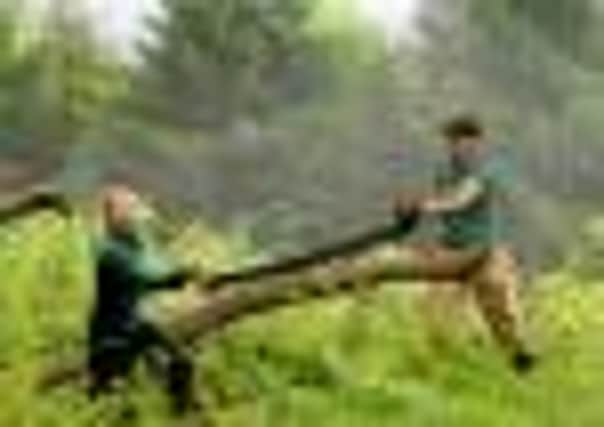They chopped down trees and wore high heels: Remembering the wartime lumberjills of Dalby Forest


The Women’s Timber Corps, which was set up to provide a steady supply of wood during the Second World War, made a vital contribution to the fight against Hitler.
Known as the “Lumberjills” and an off-shoot of the Women’s Land Army, their numbers included females from all social backgrounds dressed in distinctive green uniforms and filling in for men away fighting.
Advertisement
Hide AdAdvertisement
Hide AdTimber was crucial to the war-time economy and was used for pit props, aircraft manufacture and explosives.


And North Yorkshire’s woods were seen by Churchill’s Government as a vital source, with lumberjills operating across areas including Dalby and Cropton Forests, near Pickering, and Boltby and Kilburn, between Thirsk and Helmsley.
Now 70 years on, the Forestry Commission has launched an appeal to gather information on the massive contribution made by the lumberjills, many of whom were recruited from the region, to honour “one of the last unrecognised stories of the Second World War”.
One lady who has already come forward to contribute her memories to the project is Edna Holland, 87, from Beverley.
Advertisement
Hide AdAdvertisement
Hide AdShe joined the Women’s Timber Corps at 17 and trained in Wetherby before being posted to a lumberjills camp at Boltby, near Thirsk, an idyllic spot on the edge of the North York Moors.


On her first day she arrived in Thirsk and waited by the marketplace clock with two other girls. Eventually a man in a lorry came to pick them up and take them to Boltby - it was the first time she had ever left home and the start of a three year tour of duty on the home front.
“It was very hard work, but we learnt such a lot,” she said.
“We started off by learning to fell a tree. Then we were taught how to measure different sized pit props. My goodness we got muscles everywhere, but it made us feel really good.
Advertisement
Hide AdAdvertisement
Hide Ad“Our uniform consisted of shoes, boots, jodhpurs, dungarees, two shirts, a green jumper, coat and beret. The dungarees did not stay like that for long as we cut them off into shorts. We were sent special issue undies, which we didn’t like either, so we cut those off into shorts too.
“I think because we were cutting a tree down into pit props and we would see it through from start to finish, there was a satisfaction in what we did. We knew how it important it was for the war. I felt really proud of our contribution.”
Boltby Camp comprised a series of Nissan huts in a field. Each hut was shared by 10 girls each, with a log burner in the middle.
Mrs Holland says the best thing about life in the timber corps was the comradeship, with her fellow lumberjills providing vital support when her brother Bill was killed during the invasion of Italy in 1943.
“We were all devastated,” she said.
Advertisement
Hide AdAdvertisement
Hide Ad“I was very close to him and he was very popular with all the girls.
“We went to weekend dances in Thirsk, where we did ballroom dancing like the waltz and the quick step, which we learnt at the dances. The Royal Corps of Signals was based in Thirsk and they brought a band to the dances.
“If I hadn’t have worked in the forests, I would probably would have had to work in munitions factories in Doncaster, but I didn’t want to do that.
“Otherwise I would have joined the Land Army. The Timber Corps was just great, I learnt so much.”
Advertisement
Hide AdAdvertisement
Hide AdAs more information about the heroic efforts of the lumberjills comes forward, it is also now inspiring their modern day counterparts.
Sarah Bell, 20, from Kirkbymoorside, a works supervisor with the Forestry Commission, said: “These days machines do a lot of the back-breaking work, but in the 1940s forestry was far more labour intensive.
“The only way to cut down a tree was to use a saw or axe - chainsaws still hadn’t been invented. The girls were made of tough stuff and it’s time their contribution was better known.”
Petra Young, project officer from the Forestry Commission, said: “The great efforts of our Lumberjills must be one of the last unrecognised stories of the Second World War.
Advertisement
Hide AdAdvertisement
Hide Ad“We forget how vital timber was to the war effort and yet so little is known about the women who kept the nation’s forestry working.
“I am extremely grateful to projects like this which are striving to gather information before it slips from our collective memory.
“North Yorkshire’s forests were an important source of timber.
“We know that Lumberjills served here until the end of the war as we have vintage photographs.
Advertisement
Hide AdAdvertisement
Hide Ad“But there are many stories waiting to be discovered. These memories will help us write another chapter in the history of our woods.”
Anyone who has family that served in local Forestry Commission woods during the Second World War, is urged to contact Petra Young on 01751 472771 or email [email protected].